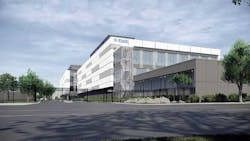STACK Infrastructure Expands Data Center Campus in Silicon Valley
STACK Infrastructure will expand its data center campus in Silicon Valley, adding a 32-megawatt facility adjacent to its current building in San Jose, the company said today. The project is the latest in a series of capacity expansions for STACK Infrastructure since the company’s launch in early 2019.
The STACK expansion continues the data center building boom in Silicon Valley, which is seeing a surge in construction after a period of limited supply. Silicon Valley is one of the largest and most important data center markets in the U.S., providing space for servers to deploy new hardware and services from the region’s marquee technology companies, as well as a legion of fast-moving startups.
“As home to a number of the world’s leading technology companies, Silicon Valley is undoubtedly one of the most compelling markets in the world for data center investment,” said Brian Cox, Chief Executive Officer of STACK. “We consider our ability to deliver cost-efficient, renewable energy to be extremely important in this market where our clients are seeking strategic proximity. We’re confident that our newest development will help our clients fulfill critical business requirements in a world-class facility.”
STACK has deep roots in Silicon Valley, where the company and its predecessors have operated since 2009. The San Jose campus was originally Seagate chip fabrication facility, and was converted into a data center by Fortune Data Centers, which later became part of Infomart and now STACK.
Capitalizing on recent leasing success, STACK says it intends to break ground on a 32-megawatt, 240,000-square-foot data center on its campus, which has 4.5 acres of property, including a parking lot area that can support additional capacity.
The STACK campus was one of the first data centers to choose their power provider through the PG&E Direct Access program to offer power to customers. Under Direct Access, eligible utility customers can choose from multiple energy suppliers. PG&E, which serves San Jose, makes money by charging for transmission and distribution, rather than a profit on the sale of electricity itself. In San Jose, the primary advantage of Direct Access is pricing. It allows STACK to offer cheaper rates than its immediate neighbors, but also to compete with providers in Santa Clara, where municipal utility Silicon Valley Power has historically offered better pricing than PG&E.
STACK Infrastructure was formed by investor IPI Data Center Partners with assets acquired from Infomart Data Centers and T5 Data Centers, giving it a national footprint spanning 1.5 million feet of space and 100 megawatts of capacity. The company has data centers in Atlanta, Chicago, Dallas/Fort Worth, Northern Virginia, Silicon Valley, Oregon and Ohio.
The Stack Infrastructure campus in San Jose, California; (Source: Stack Infrastructure)
STACK’s strategy features a combination of “rack-ready” wholesale space for immediate delivery (Ready STACK), rapid development of powered shell data halls for larger requirements (Power STACK), and build-to-suit projects for entire campuses (Hyper STACK).
In February STACK lined up $850 million to finance the growth of its data center infrastructure. The funds will be used for expanding STACK’s existing data centers and expanding into new markets, the company said. The STACK funding will use securitized notes, a strategy which allows the company to borrow money at a lower interest rate.
Since then, the company has announced a series of data center expansion projects in Chicago and Portland, Oregon as well as a new data center campus in the growing cloud cluster of New Albany, Ohio.
STACK joins a number of providers in its decision to add capacity in Silicon Valley. Here’s a look at some of the the inventory in the pipeline:
- Vantage Data Centers is building a new campus on Mathew Street in Santa Clara, where plans to create 69 megawatts of new data center capacity. The first phase of 21 megawatts is leased.
- CoreSite is developing its SV8 property, which will offer 175,000 square feet of data center space and 18 megawatts of power capacity.
- Digital Realty has announced plans for a new campus on Lafayette Street that will add 48 megawatts of power across 403,000 square feet of data center space.
- CyrusOne has purchased a site in Santa Clara for a planned 144-megawatt campus.
- RagingWire Data Centers has announced its entry into Silicon Valley with a 16-megawatt, 160,000 square foot building on a 3-acre site in Santa Clara.
- EdgeCore has acquired 12 acres in Santa Clara and plans a campus.
About the Author



